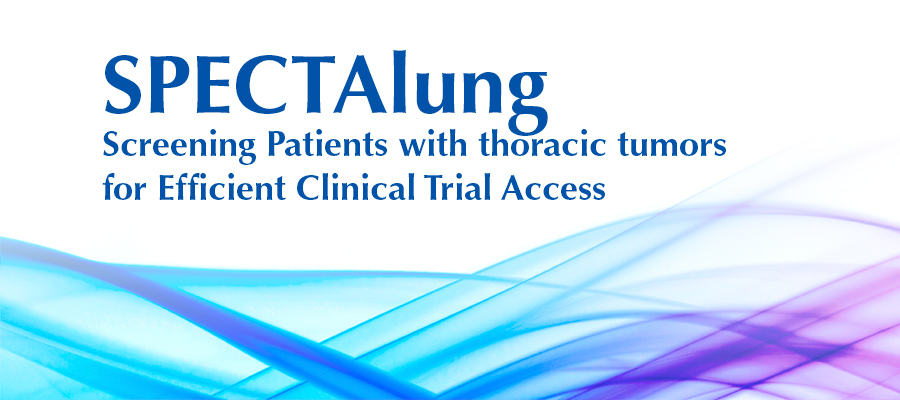SPECTAlung open to patient entry
22 Jun 2015
The EORTC-ETOP cooperation has now successfully given rise to SPECTAlung, the second SPECTA platform following SPECTAcolor.
Our understanding of tumor biology has improved and continues to expand at a rapid pace, and this has opened new opportunities for cancer clinical trials, particularly for thoracic tumors. The identification and molecular alterations in the cancer and the possibility to specifically and selectively target them, has dramatically improved the treatment efficacy in patients with lung cancer.
Still, for other thoracic tumors as well as for the majority of other cancer types, we can at this time only look back and try to understand why some patients benefitted, and others did not, form a particular treatment protocol.
SPECTAlung, the result of a partnership between the EORTC and the European Thoracic Oncology Platform (ETOP), is a standardized, quality-assured molecular screening platform for tumor characterization and storage of human biological material for the purpose of integrating new biomarkers into clinical trials and optimizing access of patients to therapeutic biomarker-driven clinical trials. 14 MG (Cambridge, United Kingdom), a diagnostic collaborator in SPECTAlung, is the central laboratory that will perform the analysis of the cancer molecular alterations for the patients enrolled in this study.
The first patients with thoracic malignancies are now entering SPECTAlung (EORTC trial 1335). Through SPECTAlung, eligible patients can be efficiently allocated to relevant therapeutic biomarker-driven clinical trials.
Dr. Benjamin Besse of Gustave Roussy Cancer Campus Grand Paris, Villejuif, France, and coordinator of this study says, “SPECTAlung has a number of advantages. First, it allows us to allocate patients to clinical trials based on both their clinical characteristics and the molecular profile of their tumor. Going beyond this, it also will enable us to identify new subgroups of tumors based upon their molecular characteristics. Finally, it will give us the opportunity to conduct further research that might lead to the identification of new biomarkers or help in the planning of future clinical trials.”
SPECTAlung plans to recruit 500 patients with pathologically confirmed lung cancer, malignant pleural mesothelioma, thymoma or thymic carcinoma at any stage during its first year. In subsequent years, 500-1000 patients will be recruited per year.
Matching eligible patients with the relevant downstream clinical trial(s) is facilitated through longitudinal patient follow-up and data collection, and these data will help further our understanding of first compared to second progression-free time, survival beyond progression, effect of treatment sequences, and survivorship issues.
SPECTAlung is coordinated by the EORTC Lung Cancer Group in collaboration with ETOP, and the EORTC Pathobiology Group and is being conducted at 18 sites located in twelve countries: Belgium, Denmark, France, Germany, Ireland, Italy, Poland, Slovenia, Spain, Switzerland, The Netherlands, and the United Kingdom.
SPECTAlung is supported by InBev Baillet-Latour.
John Bean, PhD
EORTC, Medical Science Writer
Related News
Meet the new EORTC Board
9 Jul 2024
We are pleased to announce the release of the EORTC 2023 Annual Report
17 Jun 2024
Dr Denis Lacombe, EORTC CEO, appointed stakeholder co-chair of ACT EU advisory group
24 May 2024
Clinical Trials Day 2024: a Q&A on pragmatic clinical trials
20 May 2024
EORTC/EMA workshop suggests an international way forward for treatment optimisation studies
8 May 2024
EORTC’s Participation at the ESTRO Congress 2024
29 Apr 2024
EORTC: Advancing research and treatment for rare cancers
29 Feb 2024
EORTC Fellowship Programme: celebrating more than 20 years of impactful collaboration
22 Feb 2024
Appointment of Malte Peters as EORTC Strategic Alliance Officer
9 Feb 2024
Unique series of workshops in partnership with the European Medicines Agency (EMA)
7 Feb 2024


